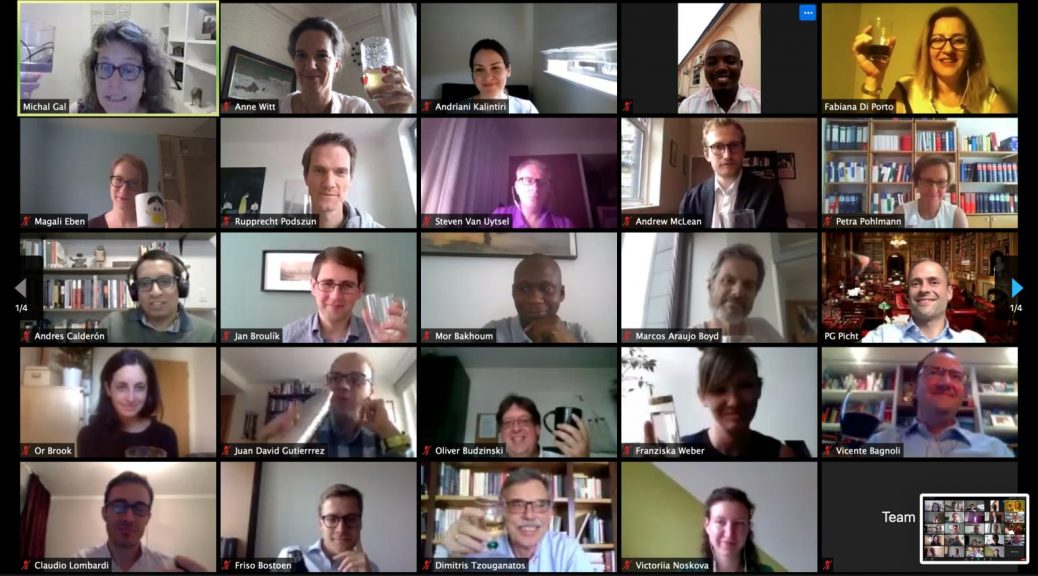
Conference Debriefing (20): ASCOLA2020
The Academic Society for Competition Law, ASCOLA, regularly brings together the academics who research and teach in the area of competition – even this year! Instead of going to lovely Porto, however, the community of antitrust aficionados met in a three-day-Zoom-conference. Rupprecht Podszun was one of the hosts. He is the Ascola Vice President, and defying all journalistic ethics, he interviews himself here and gives his personal conference debrief for the readers of D’Kart. Thankfully, less biased Friso Bostoen shares his thoughts on one specific panel, too.
Name of the event: 15th Annual Conference of the Academic Society for Competition Law (ASCOLA)
General Topic: Competition and Innovation in Digital Markets
Time and place: 25-27 June 2020, world-wide
Hosts: Universities of Haifa (Michal Gal), Zurich (Peter Picht) and Düsseldorf (Rupprecht Podszun), jumping in when Corona stopped the hosts of the touch-and-feel-event in Porto (Sofia Oliveira Pais) from continuing their preparations.
Audience: Up to 200 people at a time, coming from all over the world.
Vestager was there! So really some star-power at this Ascola Conference!
One panel had US-top economists Steven Salop, Dan Rubinfeld and Dennis Carlton. I knew you would fall for the big names. Yet, academics do not go for star power, but for the exciting thought.
So you invited the Commissioner since she is such a great thinker?
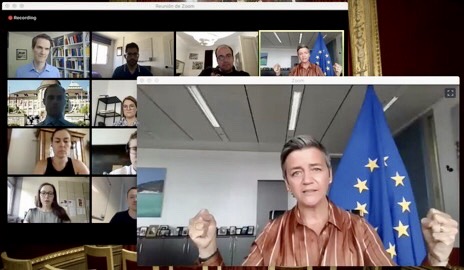
At least, she has inspired the academic debate on competition like few others in the past years – except for Mark Zuckerberg maybe and Jeff Bezos… but then: Zuckerberg dropped out of Harvard without a degree and Bezos only has a Bachelor. Not really what you would call scholarly merits. Vestager is an economist from Copenhagen University. She spoke on enforcement in changing times, highlighting the need for a new competition law tool. And she took questions from the audience.
Not bad. You never know what these academics come up with.
You could watch her thinking upon the propositions by Salil Mehra and Fabiana Di Porto on how to remedy problematic behaviour by gatekeepers: Does the very rule-oriented approach still suffice? Would algorithmic transparency be a way out? Vestager took notes. If you expected the big challenge of her course, however, you would have been disappointed. That may have to do with the fact that academia nowadays seems to be predominantly sympathetic with Vestager’s approach. Most colleagues have realised that something needs to be done if a handful of extremely powerful companies rule an essential infrastructure of modern business. And to most observers, it is obvious that the current tools do not work properly if you think of the length of proceedings, the problem with remedies or the egregious failure of merger control. So, a lot of nodding when Vestager talked about new tools. You may watch the Vestager talk here and may read her ASCOLA speech setting out her plans here.
Did she drop any news that made it into MLex at least?
Sure. She revealed that she expects the new tool to be available at the end of the year, and it should also enable the Commission to ultimately break up companies. I guess she would not mind being called “ambitious”, and it has not yet shattered Google’s stockmarket price, but still. I understood her not to be in favour of new authorities applying new competencies, but embedding these with existing agencies. She also is not a big fan of mixing consumer protection and privacy laws with competition law investigations. Finally, she officially confirmed she saw herself as the role model for TV series “Borgen”, but made it clear she is still married to her first husband – other than her TV counterpart.
You asked her?
She seems to be the most uncomplicated person I ever organised a panel with. Every PhD candidate had more questions in advance of his/her presentation than the Executive Vice President of the European Commission or her team. She logged in well before time, positioned herself in front of the camera, unmuted herself (most of the times) when she was supposed to speak, she did her talk, stayed a couple of minutes longer than expected and convinced the 200-plus audience that academic papers are loved and read in Brussels. If you have ever witnessed how some staffers of politicians freak out before an appearance of their masters this was just… hygge.
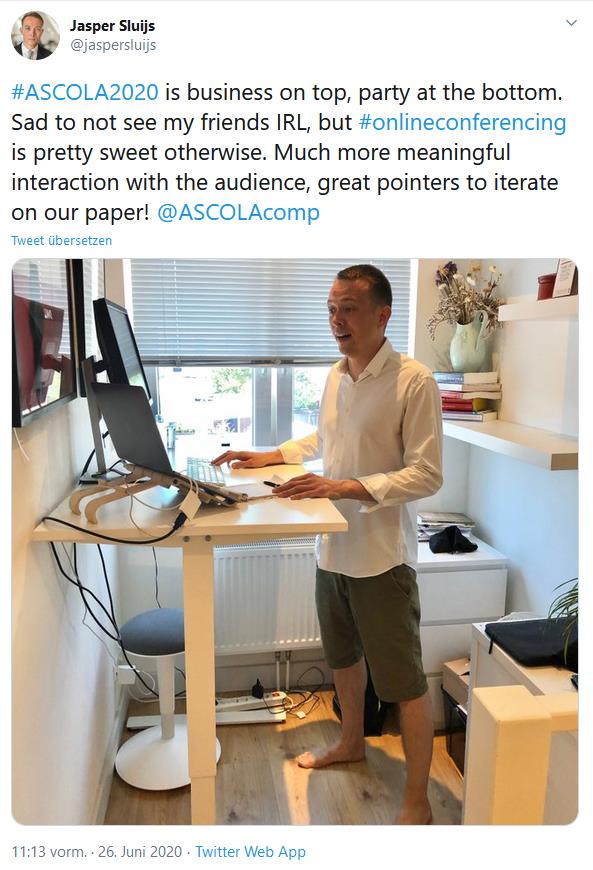
I take it that content-wise this was a three day GAFA-bashing event?
Can’t tell, but I guess not. We had nearly 100 talks, most of them in parallel sessions, so you simply were not able to catch all. Browsing through the programme, however, I see many names that sound familiar as advocates of “progressive antitrust”, but then, who, these days, is still brave enough to defend Google if you are not paid for it (and ASCOLA has a very strict Code of Ethics – see here)?
In some of the talks I attended I had the impression that the debate is now moving on and that we grapple with the nitty-gritty details. Once it is established that “something needs to be done”, the details get more important, and here, law-makers are in the driving seat. It is hard to keep pace with these developments on the political and the business level.
Scholarship is lagging behind?
Let me put it this way: Scholars had a massive impact in shaping our understanding of the digital economy, and many of our papers are path-breaking. But if you wish to know whether the exact wording of section 19a of the planned German competition act is a direct hit, you probably need a five-hours workshop, not a 12-minute speaking slot at an international conference. Or, as Simonetta Vezzoso put it when exploring data portability issues: There is simply no one size fits all approach.
Other phenomena are simply hard to catch, you sense there is a problem, but exploring it takes time – too much time for quick intervention. I thought of this when listening to Greg Day and Abbey Stemler speaking on “dark patterns” or Victoriia Noskova, presenting her work on Digital Personal Assistants. In this regard, I found it illuminating what Matthew Cole pointed to: According to the research by Comin and Hobijn, the adoption of technology in US households has become very quick: It took much longer for everyone to have a vacuum cleaner than to have a cell phone. Accordingly, the window of opportunity for market entrants and for accompanying legislation is very small nowadays. We are talking network effects here, of course, and the consequence of Matthew’s talk is obvious: be careful with mergers in the early years, and do not confuse explosive growth with low barriers to market entry. In pandemic times, Matthew used the term “Virgin Soil Effect” that according to my Wikipedia-knowledge comes from epidemiology. Nice fit!
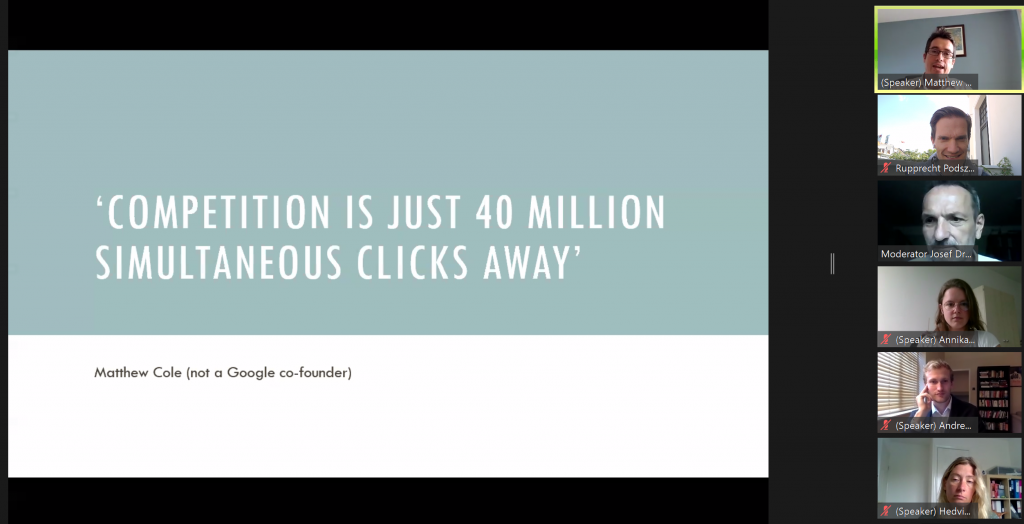
So, all these competition law professors and researchers were online, glued to the screen for three days in a row, while criticising the digital stuff, right?
I ignore your oh-so-witty observation. Not all of them were online all the time, I guess, but there was not a single panel during these days that did not reach a really good crowd. On Saturday night, when the official closing ceremony had already taken place, there was one final evening session chaired by David Bosco who had been such a great host in Aix-en-Provence last year. This was from 6 pm to 8 pm Brussels time on a Saturday, and there were 60 or 70 people zooming in, including legendary Eleanor Fox from New York. All the tech stuff really worked well, and all these people are very used to it. Professor are tech-pros since they teach online all the time. Wolfgang Kerber for instance, steering my panel, looked somehow like a Tornado pilot in the cockpit and had the same oversight (basically reminding me after one minute that the time is up, or so it felt for me). Probably, Steven Salop had the most spectacular background in his home, I can speak freely now, since we have his panel in audio recording only. I know some people were more engaged with the laundry basket in his back and the children or grandchildren running through the house than with his statements on the consumer welfare approach.
No details on his laundry, please!
“Dirty laundry” reminds me of “toxic competition”, a new buzzword that Ariel Ezrachi and Maurice Stucke came up with. Basically, these two popstars of the competition trade claim that competition is not always good but may also bring out the worst in us. That’s what they propose in “Competition Overdose”, one of the books officially launched at ASCOLA. Maurice put a question to Margrethe Vestager on this, and she replied that it is “perfectly legitimate” that legislators set the frame for competition, meaning that competition shall only be possible within the boundaries set by the laws. I found that a pretty far-reaching acknowledgment of hers, yet it sets the tone for a future problem that featured on the agenda of ASCOLA: How do we integrate other concerns than competition into competition law?
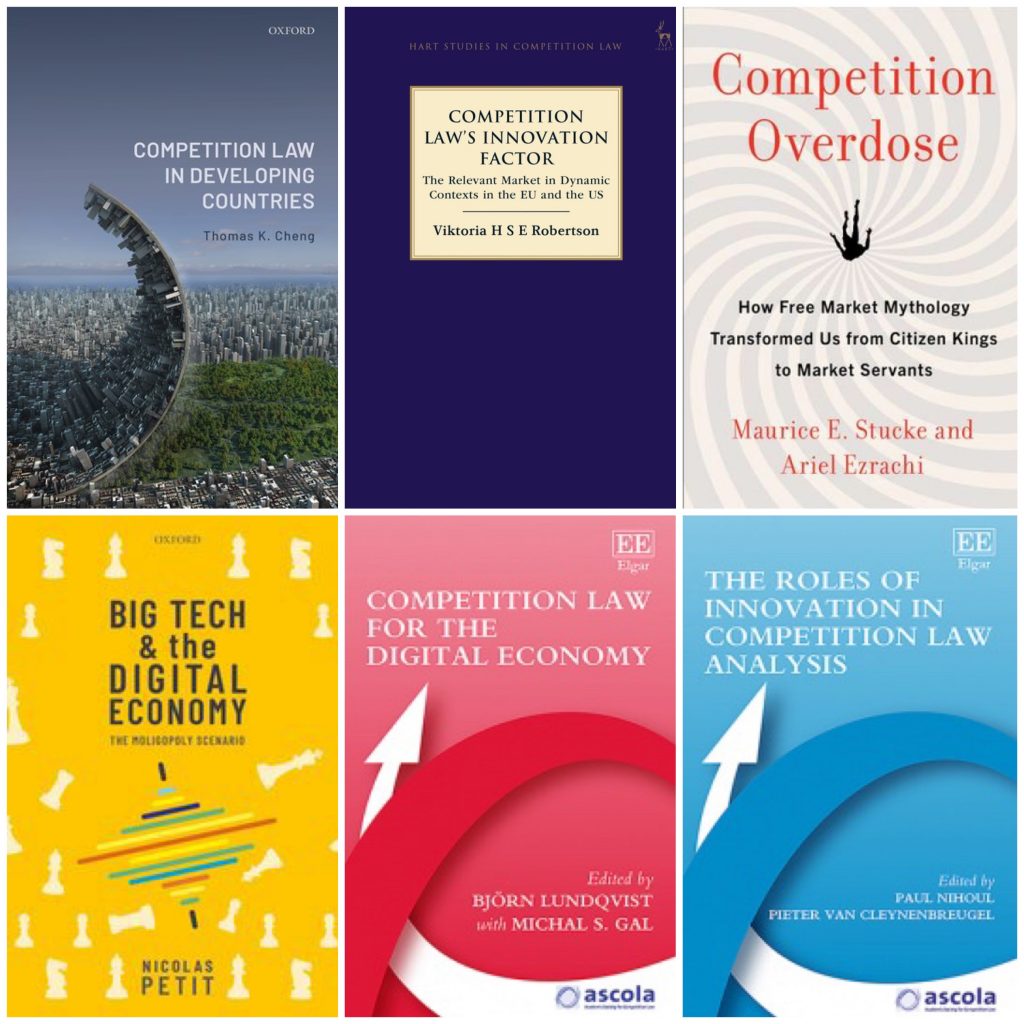
Let me guess: Like data protection in the Facebook case?
Oh, Facebook! The German Bundesgerichtshof had decided right in time for ASCOLA on the Facebook data case of the Bundeskartellamt. I found it interesting that Bhusan Jatania said that this case was super-important for India since the country does not have data protection rules and thus looks closely into the possibilities of enforcing privacy via competition. Stunning, how developments play out internationally.
Just one other piece of evidence: Juan David Gutierrez and Manuel Abarca presented cases from Latin America with familiar names like Uber. It always warms my heart to find out that others some thousand kilometres away are actually trying to crack the same nuts.
Coming back to your question: Data issues and competition law are of course talk of the town, Michal Gal (the president of Ascola herself) dedicated her talk to the interplay as did others like Thomas Tombal. Consumer protection and competition are equally intertwined – and the boundaries are difficult to draw, be it in Japan (Kazuhiko Fuchikawa) or the EU (Konstantina Bania). In the future, the integration vs delineation issue is probably equally important in the field of sustainability, and some talks dealt with that. So, there is a certain movement to integrate such concerns or to strengthen cooperation of agencies in these fields. I am not yet 100-per-cent convinced, in particular if we do not manage to set the limits. Viktoria Robertson who last year took home the Junior Best Paper Award this year advanced a reading of antitrust law that is open to such concerns. She was asked whether this does not expand the scope of competition law. She had thirty seconds to answer (assigned to her by chairman Ioannis Lianos who is the academic-turned-head-of-agency who still loves Ascola, just like Paul Nihoul, the judge at the European Court). Vicky, in her thirty seconds, made the case for going back to the origins of antitrust, i.e. democratic values, not economic efficiency.
Now that you mention it: Who won this year’s Junior Best Paper Award?
First of all, since I was part of that reviewer panel, let me say that the young people really make the difference. They are so good! Oh, and read Friso’s report, please, on the Panel with Tips for Young Academics! That was so good, too! If you ask me who is the cool kid in town these days, please fasten your seat-belt: It’s a guy called Walter Eucken.
The Freiburg ordoliberal?
Exactly. If you thought ordoliberal concepts of competition law were dead as a dodo you better check your rooftop – maybe there is a dodo up there! I heard references to Eucken from so diverse people like Shilpi Bhattacharya, Magali Eben or Alexandr Svetlicinii. It seems that the more normative approach to competition policy leads the way.
And the Oscar goes to…?
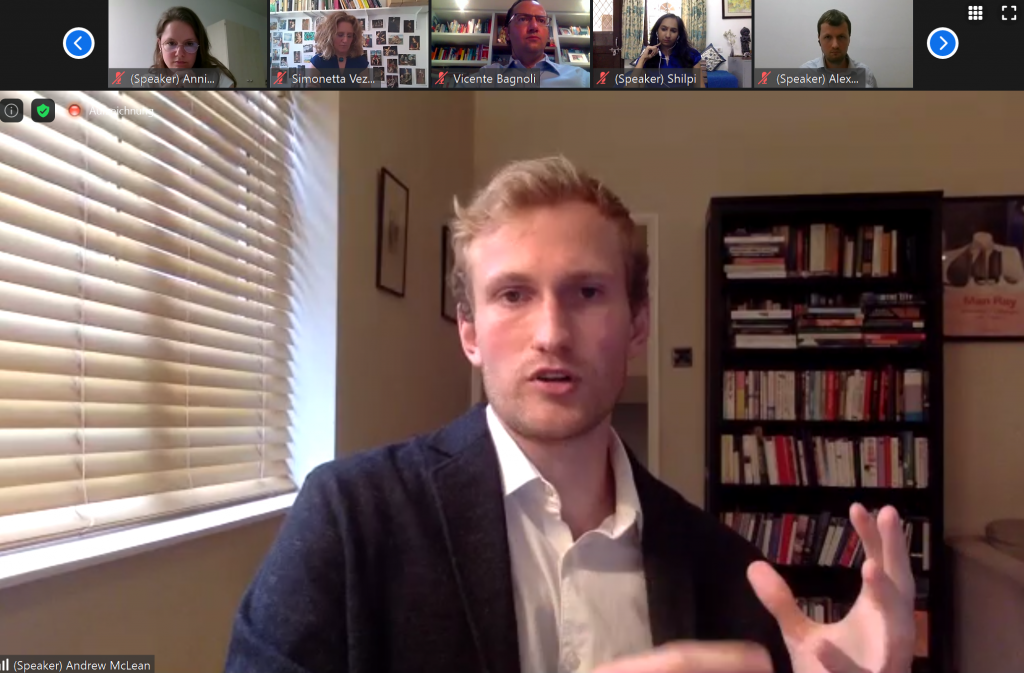
Andrew McLean won Best Paper. His was a take on killer acquisitions, and he took a financial perspective and wrote a very elegant, well-crafted and convincing paper that we may need to have an economic-goodwill benchmark for measuring the value of a transaction. You may read it here, just as a reminder what a nice paper may look like. He integrates expertise from both fields, law and economics, and I have the feeling that financial market issues are heavily under-researched in our field.
Before reading that… any highlights we have not yet covered?
First, it struck me that there were several similar papers with an empirical approach to priority setting by competition agencies. Important topic, interesting methodologies. Watch the projects coming up – with Or Brook and Kati Cseres, Ben Van Rompuy and Marcin Kaminski.
Secondly, there were so many talks! I cannot give you the highlights of the conference, this is just a personal, subjective, arbitrary report of the panels that I happened to attend. Please accept my apologies for this huge information gap.
Thirdly, let me share a secret. The panel I loved was the one called “General Perspectives”. This was like the cramped drawer where you put all that stuff into that does not fit into any of the other drawers with nice labellings like “Competition, Innovation, and IP”, you know? And as with those drawers at home, this was just exciting to search through: It started off with Jasminka Pecotic Kaufman describing how informal governance structures play a role in applying competition law in post-socialist economies. Jan Broulík suggested that the revolving doors in Brussels and Washington D.C. lead to “social capture” so that competition agencies lack some bite. Oles Andriychuk diagnosed that competition law moves into the postmodernist stage. (I hope, though, we are spared at least from a Sokal affair (this Alan Sokal is not to be confused with Danny Sokol, although both definitely share a lovely lust for exposing academic mumbo-jumbo)). Marek Martyniszyn explored ways forward in combatting international harms to competition – a topic that fell off the table, it seems, in the past years. The heart-throb of this inspiring panel however was Mary Catherine Lucey who spoke on “feminist perspectives on competition law enforcement”. Finally, gender studies make their way to our field that had seemed to be so neutral. It is not.
Oh my god…
Goddess! More on this and all the other topics next year – in Porto. For real! And up till then, please check out the ASCOLA conference website where you find many of the papers, short videos and recordings of the sessions (browse by using the programme of the conference and find your way around). Have fun. And if you find new gold nuggets, please let us know in the Comments Section here. And now, over to Friso Bostoen’s report!
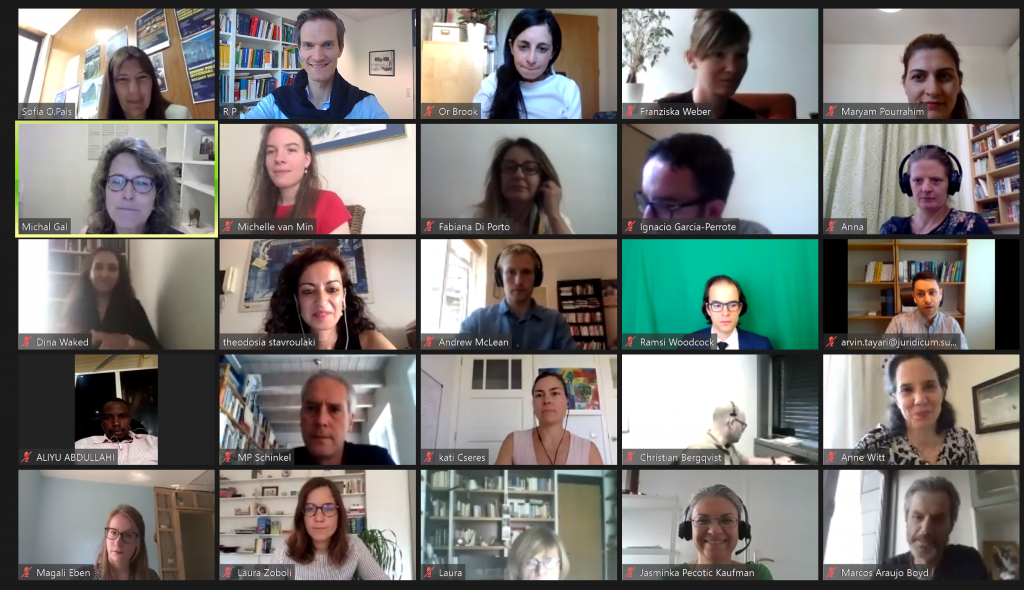
One thought on “Conference Debriefing (20): ASCOLA2020”
I am impressed by the details that you’ve been on this blog. Bookmarked this web page,
will come back for extra articles. I found simply the information I already searched everywhere and simply could not come across. What an ideal web site.